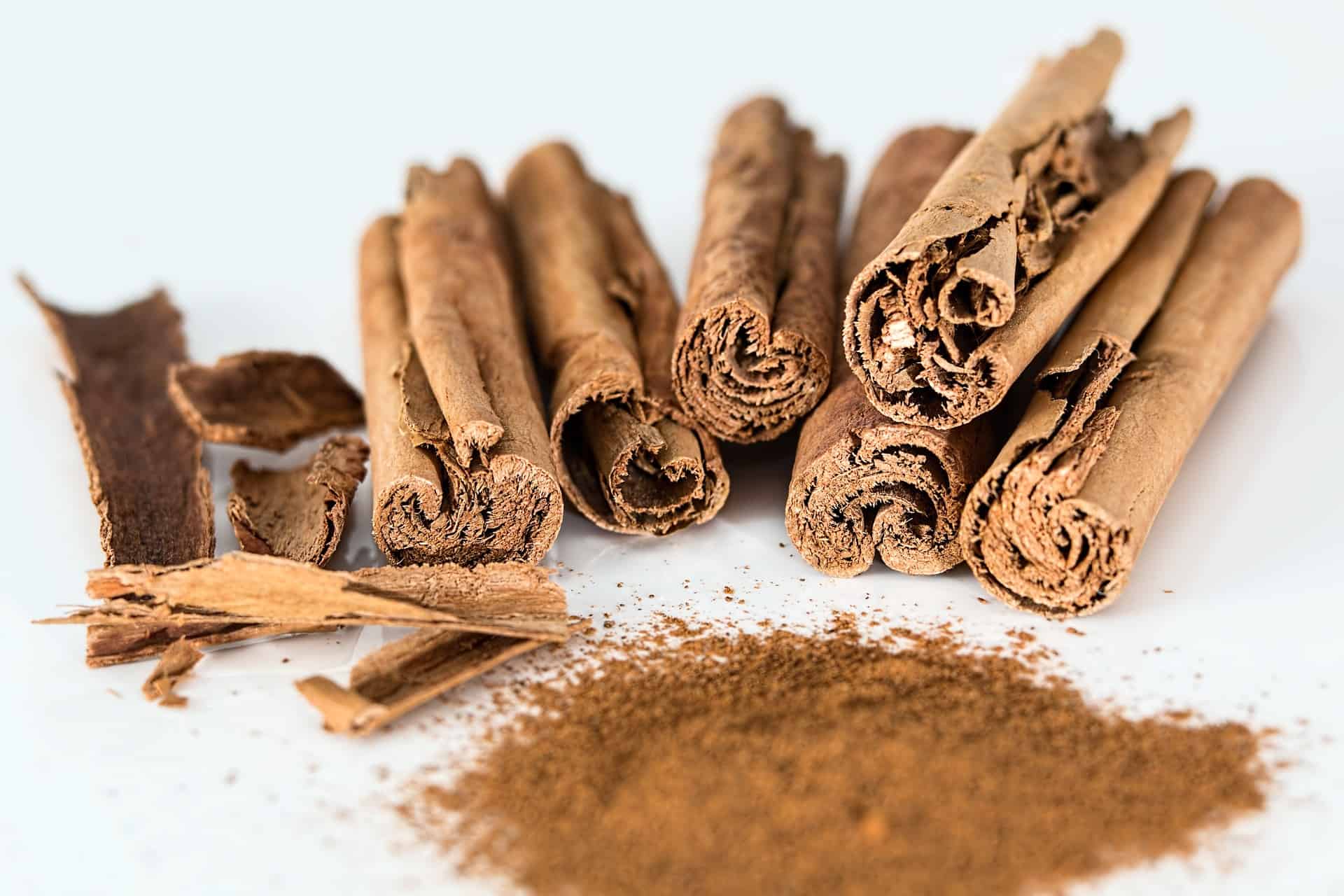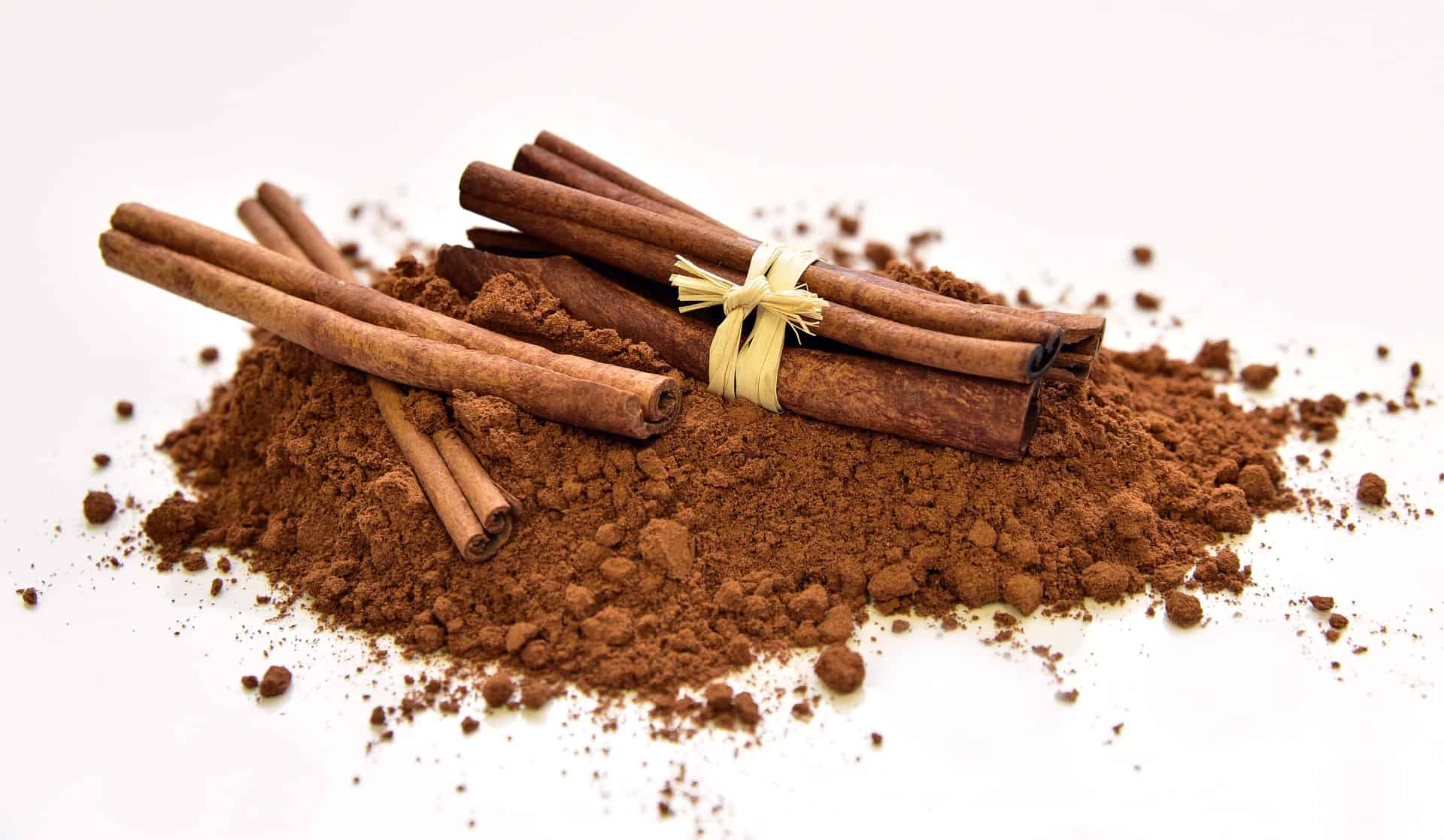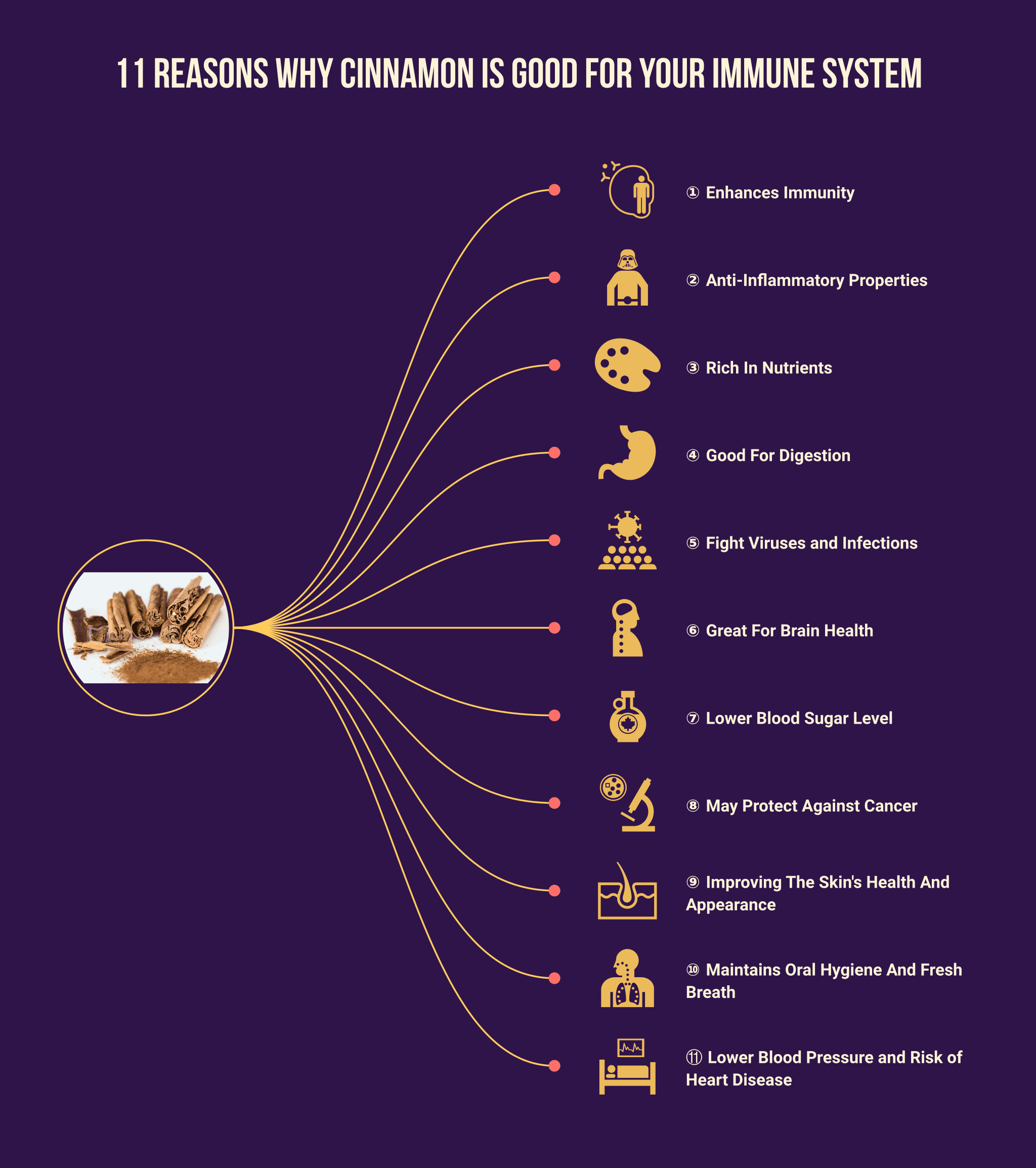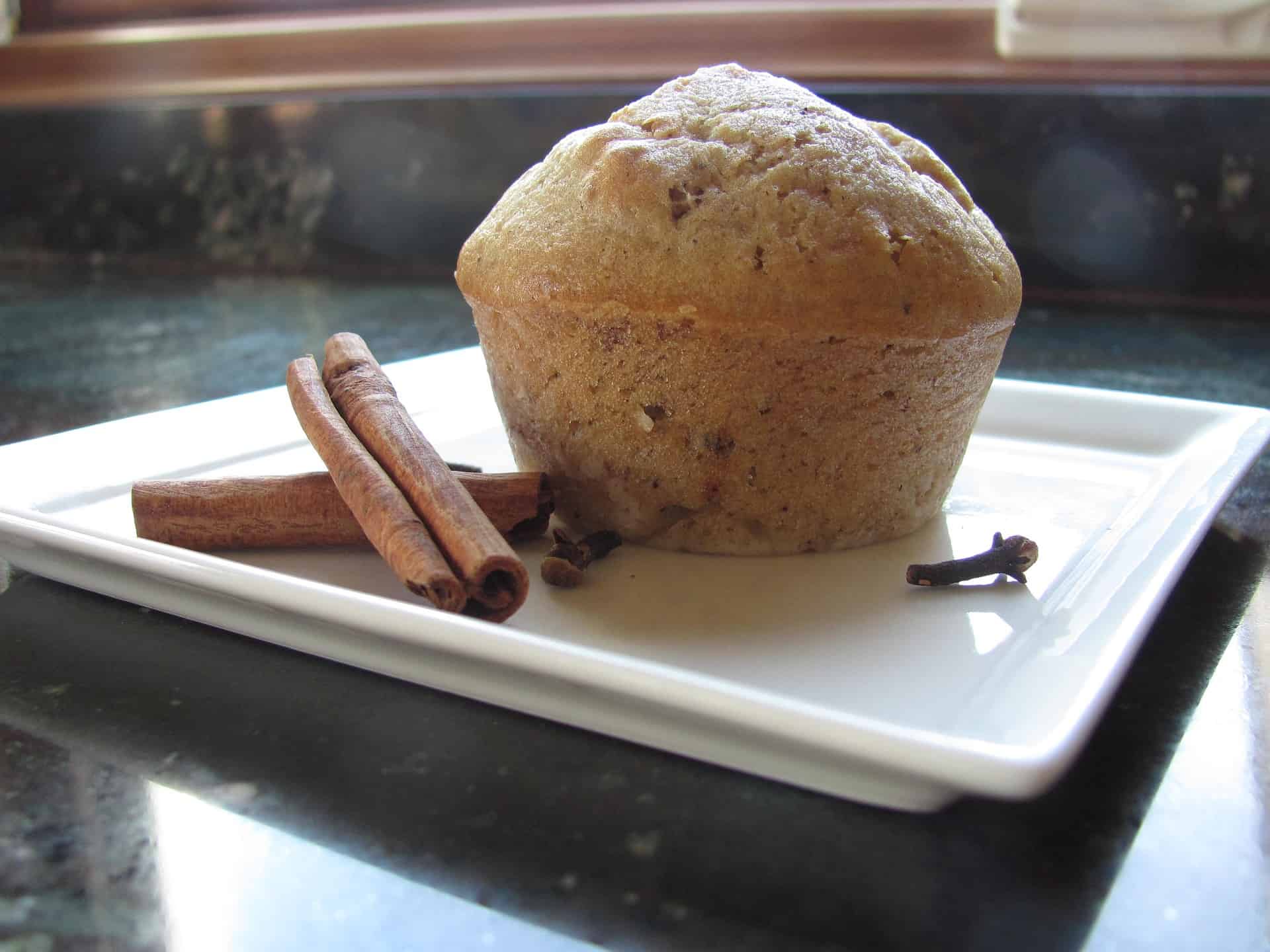 We all know that eating a healthy diet and getting regular exercise are key components of having a strong immune system. But is there another way to boost your immunity? Could something as simple as cinnamon be the answer? Is cinnamon good for your immune system?
We all know that eating a healthy diet and getting regular exercise are key components of having a strong immune system. But is there another way to boost your immunity? Could something as simple as cinnamon be the answer? Is cinnamon good for your immune system?
The answer may surprise you!
Cinnamon’s favorable effects on the immune system make it stand out from other herbs and spices, and the combination of its flavor and health benefits may seem too good to be true. Fortunately, you can obtain enough cinnamon by simply adding it to your food on a daily basis, rather than having to take a supplement (though supplements are a fantastic method to guarantee you’re receiving enough for the health-promoting impact).
Cinnamon is packed with antioxidants, making it a powerful immune system booster. These antioxidants can help fight off the free radicals that damage our cells, causing inflammation and disease.
This article will explore how cinnamon can benefit your overall health, including its effects on the immune system. We’ll also look at some ways to incorporate more of this delicious spice into your daily life. So read on to learn more about why cinnamon might be the secret ingredient for better immunity!
What is a Cinnamon?
Cinnamon is a spice derived from the inner bark of evergreen trees belonging to the genus Cinnamomum. It has been used for centuries in traditional Chinese and Ayurvedic medicine for its many health benefits.
In terms of flavor, cinnamon has a sweet and aromatic taste that you can use to enhance both sweet and savory dishes. It’s often used as a baking spice but can also be found in many cuisines worldwide, including African, Middle Eastern, and Mexican dishes.
In terms of nutrition, cinnamon is an excellent source of antioxidants, dietary fiber, calcium, iron, manganese, and magnesium. Furthermore, its impressive nutrient content also contains active compounds like cinnamaldehyde and cinnamic acid that are believed to help reduce inflammation by blocking inflammatory pathways in the body.
The Different Types of Cinnamon

Cinnamon comes in two varieties: Cassia cinnamon and Ceylon cinnamon.
Ceylon cinnamon, also known as ‘true’ or ‘Mexican’ cinnamon, is slightly sweeter and less intense than its cousin Cassia cinnamon. It has an earthy flavor profile with subtle hints of citrus, making it an ideal addition to sweet dishes such as apple pie or sticky buns. Ceylon cinnamon is also known for its many health benefits, containing three times more antioxidants than Cassia cinnamon.
Unfortunately, because of its low coumadin levels (a compound that can cause liver damage when consumed in high doses) and high cost, it’s not as widely used in cooking as Cassia Cinnamon.
Cassia Cinnamon comes from the Cinnamomum cassia tree native to Southeast Asia and Southern China. It has a stronger flavor than Ceylon Cinnamon and contains higher levels of coumarin, which can be toxic when ingested in large amounts over long periods. This type of cinnamon is often used to make traditional Chinese dishes such as Five Spice Chicken or Red Cooked Beef short ribs.
In addition to these two main types of cinnamon, there are other variations with different aromas and flavors. For example, Korintje Cinnamon has a slightly sweet flavor with notes of clove, while Malabar Cinnamon has a spicy aroma with hints of peppermint.
Saigon Cinnamon is considered by many to be the strongest variety due to its distinctively intense flavor profile that can easily overpower other ingredients in a dish; it’s best used sparingly or added at the end stages of cooking for maximum impact!
11 Reasons Why Cinnamon is Good for Your Immune System

Do you like to add some spice to your life? Consider incorporating cinnamon into your daily health and wellness routine. Here are 11 reasons why you should give this aromatic spice a try:
① Enhances Immunity
Cinnamon is an incredibly powerful spice that has numerous health benefits, including the potential to enhance immunity and protect against illnesses. Studies have shown that incorporating cinnamon into your daily diet can increase the effectiveness of your immune system by reducing inflammation and boosting antioxidant activity.
For example, a study published in the journal Phytomedicine found that cinnamon extract could reduce levels of pro-inflammatory cytokines in humans while also increasing levels of anti-inflammatory cytokines. Cinnamon may help to reduce inflammation and improve overall immune system function.
In addition, compounds found within cinnamon are known to be potent antioxidants, which help protect your cells from damage caused by free radicals. Antioxidants are important for helping to prevent disease and maintain overall health and immunity.
② Anti-Inflammatory Properties
Is there anything better than a hot cup of tea to ease the pain of achy muscles and bones? What could be more comforting than a warm, calming tea that also happens to be good for you by lowering inflammation levels?
An inflammatory response occurs when the body’s white blood cells rush to the site of an injury to rid itself of harmful invaders. Fluid is released into the area due to chemicals released by white blood cells, causing swelling, which, as we all know, can be rather painful. Because of the added pressure that results from fluid accumulation, joint swelling can be rather painful.
Cinnamon has been found to contain powerful anti-inflammatory compounds that help reduce swelling and alleviate pain. Furthermore, cinnamon possesses antioxidant properties that can help protect from disease-causing free radicals.
③ Rich In Nutrients
Are you looking for a delicious and nutritious snack? Look no further than cinnamon! This aromatic spice is an excellent source of essential vitamins and minerals like iron, calcium, manganese, magnesium, and dietary fiber.
The iron found in cinnamon is important for forming red blood cells and transporting oxygen throughout the body. Calcium helps to strengthen bones, while manganese plays an important role in the metabolism of carbohydrates and fats. Magnesium is important for muscle and nerve function, and dietary fiber helps to lower cholesterol levels.
Cinnamon is also a good source of B vitamins, which can help to improve cognitive function and energy levels.
④ Good For Digestion
Cinnamon holds a wide range of digestive benefits and can easily be incorporated into a daily diet. Cinnamon has been used for centuries as an effective remedy when it comes to reducing upset stomachs and nausea – which is due in large part to the presence of cinnamaldehyde, an organic compound found within cinnamon and responsible for its intoxicating aroma.
Much like other spices, cinnamon’s strong flavor helps stimulate digestion by activating salivary glands. This means cinnamon is good at relieving occasional digestive discomfort and helping prevent it, providing long-term support for those with weak or otherwise afflicted digestion.
Supplementing your diet with just a teaspoon of cinnamon powder each day can help efficiently aid digestion and allow you to maintain a healthy gut.
⑤ Fight Viruses and Infections
Cinnamon has long been known as an incredibly powerful antiviral and antifungal remedy. Still, with the arrival of the novel Coronavirus (COVID-19) pandemic, people are wondering if you can use it to fight against this particularly dangerous virus. Unsurprisingly, there’s increasing evidence that cinnamon provides some protection against the virus.
Several studies have already shown promising results, suggesting that cinnamon might be used therapeutically against viral infections—including its antiviral activity, immunomodulatory effect, antioxidative capacity, and other actions. In particular, cinnamon’s active ingredient, cinnamaldehyde, has been observed to inhibit certain viruses from replicating and transmitting through cells.
Meanwhile, the herb’s anti-inflammatory properties may also help alleviate uncomfortable symptoms associated with various infectious diseases. As further research continues to investigate this herbal powerhouse’s virus-fighting abilities even more closely, cinnamon should not be discounted just yet when effectively fighting infection during this pandemic.
⑥ Great For Brain Health
Cinnamon has amazing brain-boosting benefits. Studies have suggested that the active compounds in cinnamon may help protect the brain from degenerative diseases like Alzheimer’s and Parkinson’s by reducing inflammation, fighting oxidation damage, and improving blood flow.
In addition to these protective properties, consuming cinnamon can also improve memory and concentration levels as well as enhance cognitive functioning. This could be due to its ability to stimulate the production of certain neurochemicals in the brain, such as serotonin and dopamine.
⑦ Lower Blood Sugar Level
There is widespread recognition of cinnamon’s ability to reduce blood sugar levels. Cinnamon’s blood sugar-lowering effects extend beyond its ability to improve insulin sensitivity.
The first benefit of cinnamon is that it lowers post-meal blood sugar levels. It achieves this by preventing some of the digestive enzymes from doing their job and thereby slowing the digestion of carbs.
Second, some evidence suggests that a component in cinnamon can mimic insulin’s activities and boost sugar uptake by cells. Numerous human studies have validated cinnamon’s health benefits, indicating it can reduce fasting blood sugar levels and enhance hemoglobin A1c, a sign of long-term blood sugar control.
Commonly, a daily intake of 1-6 g, or around 0.5-2 tsp. of cinnamon, is beneficial.
⑧ May Protect Against Cancer
Do you know that cinnamon may also protect you from cancer? Numerous studies have shown that the many compounds in cinnamon, such as cinnamaldehyde, eugenol, and gallic acid, are toxic to some types of cancer cells while leaving healthy cells unscathed.
The anti-cancer properties of cinnamon have been studied mainly with regard to colorectal cancer, but it’s thought to have a protective effect against other cancers too. Plus, cinnamon’s antioxidant content helps fight the damage caused by free radicals and oxidative stress, which may also play a role in cancer formation.
While more research is needed before you can draw concrete conclusions about its protective effects, this ancient spice looks very promising for cancer prevention.
⑨ Improving The Skin’s Health And Appearance
While most of the country enjoys great fall weather, it also brings with it dry air and wind that may be tough on the skin. The antibacterial and anti-inflammatory effects of cinnamon are beneficial to skin health. When used topically as a cinnamon essential oil, it can calm itchy, irritated skin.
Always dilute skin care products containing cinnamon oil with a carrier oil, such as almond or jojoba, which are also emollient and can help alleviate dry skin.
A face mask made of raw honey and a few drops of cinnamon essential oil is a great way to pamper your skin and give your face a healthy glow this fall. Apply all over the face, let it sit for 15–20 minutes, and then wipe it off with a warm, wet washcloth.
⑩ Maintains Oral Hygiene And Fresh Breath
Isn’t it great when you can use natural products to keep your mouth healthy and happy?
Cinnamon has naturally occurring antibacterial properties that work to reduce the buildup of oral bacteria, which can cause bad breath. In addition, cinnamon helps to fight mouth infections and reduces the accumulation of plaque on the teeth.
Furthermore, cinnamon contains compounds known as catechins which help stimulate saliva production, washing away food particles and clearing up unpleasant odors. Cinnamon can be highly effective when consumed regularly, supporting good oral health – promoting fresh breath, and keeping your smile healthy and bright.
⑪ Lower Blood Pressure and Risk of Heart Disease
Cinnamon is also known to be beneficial for heart health. Studies suggest that cinnamon can help lower blood pressure, LDL (“bad”) cholesterol, and triglycerides. Moreover, its anti-inflammatory properties reduce the risk of atherosclerosis, which is a type of heart disease caused by fatty deposits in the arteries.
It’s thought that cinnamon improves the body’s response to insulin and increases nitric oxide production, relaxing blood vessels and improving circulation. Taking one or two teaspoons daily can help maintain good cardiovascular health and overall well-being.
10 Easy Ways To Incorporate Cinnamon Into Your Life

Cinnamon is a versatile spice that you can incorporate into many aspects of a person’s life. To think that something as simple as a powder can contain so much deliciousness is mind-boggling. Many people associate cinnamon with ooey-gooey cinnamon buns, but there are other ways to enjoy the flavor without the unnecessary fat and sugar. Indulge in cinnamon in these ten nutritious ways:
❶ Coffee
Start your morning off with a delicious and nutritious cup of cinnamon coffee!
Simply add a pinch of ground cinnamon to your coffee grounds before brewing, or sprinkle it on top after pouring it for added flavor. Enjoy the sweet taste of cinnamon and the robust flavor of freshly-brewed coffee – perfect for reviving your senses in the morning.
Make sure that you use Ceylon Cinnamon as it is healthier than other forms like Cassia Cinnamon. Get creative and try adding flavors such as nutmeg, cardamom, vanilla extract, or even honey to make an aromatic cup of heavenly cinnamon coffee!
❷ Smoothies
Cinnamon smoothies are a great way to enjoy the nutritional benefits of cinnamon and make a delicious, healthy treat.
Start by adding 1/2 teaspoon of cinnamon to one cup of your favorite milk, such as almond milk or coconut milk. If you’d like a thicker consistency, add one frozen banana for added thickness. Then, blend in your favorite fruits and vegetables for a nutrient-packed blend.
❸ Yogurt Parfait
Create a healthy breakfast or midday snack with a yogurt parfait!
Start by adding one cup of Greek yogurt to the bottom of the cup, then layer on frozen fruit such as blueberries, strawberries, or bananas – adding a teaspoon of cinnamon for each layer. Top it off with your favorite granola or nuts and indulge in the delicious combination of flavors!
❹ Oatmeal
Cinnamon and oats are a match made in heaven – they both provide essential nutrients, vitamins, minerals, and fiber that can help keep you full throughout the day.
To make a delicious bowl of oatmeal, add one cup of oats with 2 cups of water or milk and boil. Once boiling, turn off the heat and add in 1 teaspoon of cinnamon and your favorite mix-ins such as nuts, seeds, dried fruit, nut butter, or honey.
❺ Herbal Tea
Not only is cinnamon tea a great way to get your daily dose of antioxidants, but adding cinnamon can take it to the next level!
Add one teaspoon of ground cinnamon to your favorite herbal blend for an extra boost of flavor. If you’d like something more decadent, try adding honey or nutmeg for even more deliciousness.
❻ Stir-Fries
Stir fries are a great way to get your daily dose of vegetables. Plus, adding cinnamon can help bring out the flavor of the food. A great way to incorporate cinnamon into stir-fry is by adding 1/2 teaspoon at the beginning when you’re sautéing the vegetables. This will allow the cinnamon to mix with the other flavors, adding a hint of sweetness to your meal!
❼ Baked Goods
Treat your taste buds to something truly sweet with cinnamon baked goods!
Start by preheating your oven and combining all of your dry ingredients in a bowl. Then, add butter or oil until you reach a dough-like consistency. Roll out the dough and sprinkle on one teaspoon of ground cinnamon for an added burst of flavor.
Finally, cut out shapes with cookie cutters or use a knife to make bars. Then, bake at the specified temperature in the recipe. Enjoy delicious cinnamon treats without any guilt!
❽ Pancakes
Cinnamon pancakes offer a perfect breakfast option for anyone who loves cinnamon’s warm and comforting flavor.
To make your own, start with a standard pancake batter of your favorite recipe. Then add one teaspoon of ground cinnamon to the mix for each cup of flour used.
If you enjoy a more intense taste, up the amount. Just don’t forget to adjust any other ingredients, such as liquid or eggs, so that everything stays balanced. Give the batter a good stir and cook the pancakes like any other batter. You’ll have delicious, cinnamon-scented pancakes in no time!
❾ Muffin
Making healthy cinnamon muffins is easier than you might think. Simply start by preheating the oven to 375°F and gathering your ingredients: all-purpose flour, baking powder, salt, unsalted butter, ground cinnamon, light brown sugar, milk, and eggs.
Start by mixing the dry ingredients in a bowl: flour, baking powder, and salt. Then in another bowl, beat the butter and sugar until creamy before adding the wet ingredients: milk and eggs. Next, stir in the dry ingredient mix until well combined.
Grease your muffin tin before scooping out spoonfuls of the batter into each cup before topping with an extra sprinkle of cinnamon if desired. Pop them in the oven for 20 minutes to achieve delicious golden-brown treats that are much healthier than store-bought options.
❿ Granola
Do you like munching on granola for breakfast or as a snack? Make your own with cinnamon to reap the immune-boosting benefits!
Start by preheating the oven and combining rolled oats, nuts, seeds, dried fruits, honey, and one teaspoon of ground cinnamon in a bowl. Mix everything together until well combined before transferring it to a lined baking sheet.
Bake for 30 minutes, stirring occasionally and making sure not to burn. Once finished, let cool completely before transferring to an airtight container. Enjoy your delicious homemade granola as cereal, or sprinkle it over yogurt or smoothie bowls!
Frequently Asked Questions
Q: What does true cinnamon (Ceylon) taste like?
A: True cinnamon (Ceylon) has a sweet and delicate flavor with hints of citrus. It is often considered the most flavorful type of cinnamon and has a stronger aroma than other varieties.
Q: Is it safe to consume large quantities of cinnamon?
A: While cinnamon has many health benefits, it is important to remember that too much can be harmful. Eating large amounts of cinnamon can lead to stomach upset, headaches, and allergic reactions. It is recommended that you consult a healthcare professional before taking large amounts of cinnamon or any other supplement.
Q: Do cinnamon bark and cinnamon stick have the same health benefits?
A: While both cinnamon bark and cinnamon sticks offer many of the same health benefits, they are different. Cinnamon bark is ground and used as a powder, while cinnamon sticks are the dried bark of the cinnamon tree. While you can add both to foods or beverages, the flavor is slightly different. Cinnamon bark has a stronger aroma and flavor than cinnamon sticks.
Q: Is cinnamon supplement have the same health benefits as the ground form?
A: Cinnamon supplements contain concentrated forms of cinnamon, which can provide you with many of the same health benefits as the ground form. However, it’s crucial to note that supplements may not provide the same levels of antioxidants and other beneficial compounds as the ground form. In addition, supplements may contain additives and preservatives that can be harmful to your health if taken in large amounts.
Q: Can I use cinnamon essential oil for immunity?
A: Yes, you can use cinnamon essential oil for immunity. The cinnamon essential oil has been used as a natural remedy for centuries to support the immune system and ward off illnesses. To use it, you can add a few drops of the oil to a diffuser or vaporizer and breathe in its aroma. Alternatively, you can mix it with a carrier oil such as coconut oil and apply it directly to the skin. Be sure to always use a dilution for safety reasons, and consult a healthcare professional if you have any concerns.
Final Words
Cinnamon is a versatile spice with many health benefits, including boosting the immune system. You can include it in your diet by adding ground cinnamon to foods and beverages or using cinnamon essential oil aromatically. Be sure to always use caution when consuming large amounts of cinnamon, as too much may cause adverse effects. With some simple dietary tweaks, you can incorporate this powerful spice into your routine and reap its immunity-boosting properties!
